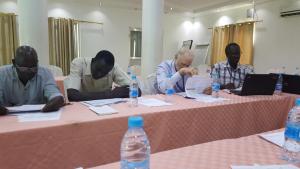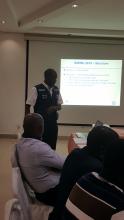South Sudan revises its 2007 Essential Medicines List to improve standards and access to Essential Medicines within the health care system
Juba 27 August 2018 – The Ministry of Health of South Sudan in collaboration with the Health Sector Partners (HSP) and with technical leadership and support from the World Health Organization has validated its 2007 Essential Medicines List.
This is part of the efforts to improve access to, availability and proper use of essential medicines within the health care system in public and private facilities.
The process of reviewing and updating the 2007 South Sudan Essential Medicines List (SSEML) was initiated in June 2016, but was shortly interrupted by the July 2016 crisis. The revision was resumed in November 2017 and concluded in March 2018.
According to Dr Moses Deng Malual, Director General of Pharmaceutical and Medical Supplies, the Ministry of Health, is cognizant of the important role an up-to-date and evidence based Essential Medicines List plays in ensuring cost effective use of resources, appropriate management and use of medicines as well as enhanced quality of patient care.
The revision and updating of the 2007 SSEML, was conducted through a bottom-up, multi-stakeholder consultative process at national and sub national levels. It was also informed and guided by the WHO 20th Model List of Essential Medicines and the 6th Model List of Essential Medicines for children 2017. The revised medicines list 2018, is expected to guide the procurement, supply and distribution of medicines as well as medicines donations, which is currently fragmented and vertical for some programs.
‘Improving access to safe, effective, good quality and affordable medical products is a major contribution towards achieving Universal Health Coverage’ said Mr Evans Liyosi, WHO Country Representative a.i. for South Sudan. He commended the Ministry of Health for the leadership, and pledged WHO’s continued support and commitment towards strengthening the fragile health system in South Sudan.
Dr Lul Lojok, who represented the Under Secretary at the opening ceremony of the stakeholders’ workshop, thanked WHO and other partners for their support. He informed the participants that the MOH was committed and taking the stewardship role against antimicrobial resistance (AMR) seriously. Dr Lul underscored the need to adhere to the Access, Watch and Reserve principles when using some of the essential medicines.
A total of 36 experts drawn from MOH, UN agencies, Donors, NGOs, Clinicians and Academia critically reviewed, validated and endorsed the SSEML 2018.
To conclude this important milestone for South Sudan, the SSEML 2018 will be presented to the Senior Management Team of MOH for approval and adoption. It will then be widely disseminated for use at national and sub national levels. Health care workers will be trained on proper use of the revised SSEML.
Together with the Basic Package of Health and Nutrition Health Services (BPHNS) and National Standard Treatment Guidelines (NSTGS), the SSEML 2018 is expected to significantly improve the delivery of quality essential health care package for the South Sudan population towards UHC through the development and humanitarian programs.




